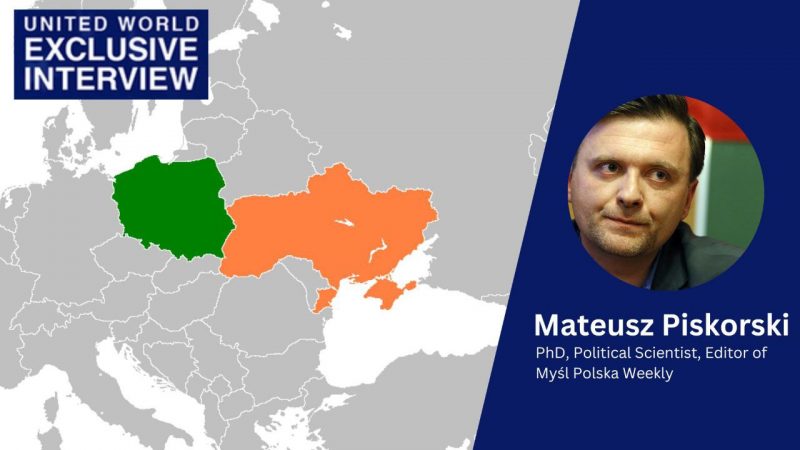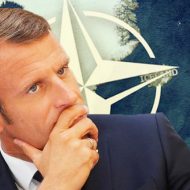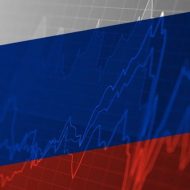Poland is heading towards elections. Since the start of the war in Ukraine, Poland has been one of the countries with the clearest position against Russia and in support of Ukraine. Yet recently there have been signs and statements to the contrary.
Despite its complete alignment with the US and the European Union in its opposition to Russia, together with Hungary, Poland has the biggest problems with the European Union. These have been voiced more loudly recently by Polish authorities.
To understand the main pillars of Poland’s position from domestic politics, history and geopolitics dimensions, we made an extensive interview with Mateusz Piskorski. Piskorski is a political scientist and the editor of Myśl Polska weekly.
Three levels of Poland-Ukraine relations
Since the beginning of the war in Ukraine, the Polish government seems to have taken the most distant position towards Ukraine. What are the reasons?
About the Polish stance on the Ukrainian issue, we can refer to one of the last interviews of the Polish foreign minister, Professor Zbigniew Rau. He announced that the relations between Poland and Ukraine depend on three different levels:
The first level according to him, let’s say the strategic one. On the strategic level, the Polish ruling class and the Polish government are still vehemently anti-Russian, which means that they perceive the Russian Federation as their main geopolitical enemy. So on the strategic level, they are still sympathizing with Ukraine and saying that Ukraine is trying to prevent Russian invasion. But there are two other levels, according to the foreign minister.
Non-complementary economic interests
The second level is the level of the national interests. Particularly economic interests of Poland and Ukraine, are deeply contradictory. Myself, I have already told it in 2014 during the coup d’état in Kyiv when Ukraine was trying to sign the association agreement with the European Union. From the economic point of view, Ukraine for Poland, as well as for other central European countries, might be perceived as an economic threat in the sense of using unjust methods like dumping prices. These are enabling Ukraine to avoid the European standards. Now this is what is happening in the grain issue. From the purely economical point of view, we can not talk about any kind of complimentary national interest between Poland and Ukraine. Remind that Poland economy is still based on agricultural. I think that’s quite interesting that the Polish foreign minister voiced that opinion for the first time since almost 9 years.
Polish public tired of supporting Ukraine
The third level, which is particularly important now as we have parliamentary elections, is the level of public opinion. So the foreign minister voiced the Polish public opinion. Poland public is somehow tired with supporting Ukraine, giving all our resources to the Kyiv government. We have spent already billions of dollars. We have sent already tons of armament, which is not so cheap. Polish citizens are, let’s say, a little bit fed up with all those permanent requests of Zelenskiy and Kyiv authorities.
Ukrainians nationalists and the Third Reich
And when it comes to the Polish public opinion, you must remember the difficult history between Poland and Ukraine. Before the Second World War, some parts of today’s Ukraine belonged to Poland at that time and Poland had a huge number of Ukrainian minority which was quite aggressively nationalistic and organizing several terrorist attacks. Our interior minister was killed in 1934 in Warsaw. In the Second World War, Ukrainian nationalists collaborated with the Third Reich and committed genocide to the Polish population living in the territories of today’s Ukraine. Around 2,150,000 Polish people were brutally killed by Ukrainian nationalists. Zelenskiy, regardless the fact that he is not Ukrainian ethnically – he has Jewish origin – seems to be quite sympathetic to these nationalistic and neo-Nazi groups which are gaining power in Ukraine since 2014. This is another reason for Polish people not to be very positive to Kyiv at the moment.
If you look at the issue from the position of the ruling party in Poland, there comes an election. To keep the power, they have to change their attitude and rhetoric, at least publicly, towards Kyiv. Of course, Kyiv is not helpful to the Polish government. In New York and in the United Nations, Zelenskiy made quite rude and aggressive statements toward Poland.
Zelenskiy abusing
In general, I have the impression that Zelenskiy and the Kyiv government are trying to use and abuse everyone around. Zelenskiy perfectly knows that now Poland is unable to send any more weapons since Poland had already sent all it got. So now he doesn’t need Poland anymore. That is important for Türkiye and for other countries that you cannot count on Zelenskiy like he will be grateful for support or he is going to give something back to you in response. This is a kind of regime, first and foremost not independent, it is a puppet of the Anglo-Saxon world, and secondly the level of corruption and political brutality is so high that you cannot count on for friendship or even partnership. Poland is an example now, but in the future Türkiye and other countries can face the same problem.
The EU and tradition-oriented countries
As you said as Zelenskiy made a speech in New York and the United Nations. He is harshly criticizing Poland because of the latest statement of the Polish government. Moreover, mainstream Western media too is harshly criticizing the Polish government. They are using their critical terms like “far right”, “populist”, “anti-LGBT” etc. They are accusing the Polish leaders are playing to the public opinion in the run-up election period. There were already a series of problems between Poland and the European Union, but now it seems like moving towards a more challenging period.
That depends on the EU. If the EU tries to force this, let’s say globalist and anti-traditionalist agenda as they are doing currently, I think that sooner or later such countries as Poland, Hungary, Slovakia and several other countries of Central Europe as well as some other more tradition-oriented countries Türkiye would distance itself from the EU. I don’t think that Turkish society would support LGBT agenda and all those issues imposed by the globalists of the EU. The same goes for Poland. Even from the civilization of view, the Polish society is quite different from Central Europe, let’s say the Dutch or even the Italians.
“Europe is not equal to the EU”
If the EU will focus on economic, political and institutional integration, the relations might go well. But as soon as they turn to the identity politics which includes all these globalist policies, I think that Poland sooner or later will distance itself from European integration. For us, as well as for many other traditional European countries, the European Union is not equal to Europe. For us, Europe is different from what EU is representing now. Most of the Polish society feel that they are Europeans, but they have a totally different understanding of Europe civilization than this dominating metapolitical circles of Western Europe. This is a big division between us. So your question is more to Brussels to us, the Polish people. Particularly it depends on Germany’s attitude since it is the leading force of the EU. If you could imagine that in Germany in some years Alternative for Germany (AfD) would come to power, I guess they would have totally different views than the Greens and other globalists about the issues I mentioned. In such a situation, the EU might change and be more respectful to national traditions and values of the member states. This does not mean homogenization, rather a genuine pluralism within Europe.
“Even the Polish liberals are too conservative in Western European standards”
Of course, there are some other economic issue etc. For instance, since being more industry-oriented, Germany doesn’t care about the fate and the future of Polish farmers. That’s why they are promoting the policy of “opening the borders”. Yet, I think the main problem is the civilizational and cultural one. This is independent of who is in power in Poland. The government might change in the election, but even the Polish liberals are too conservative in Western European standards.
A comparison between Hungary, Türkiye and Poland
If we compare Hungary, Türkiye and Poland, one would make such a comment: Türkiye and Hungary are not happy with the globalist agenda, and they are trying to take some kind of independent position. But Poland seems like much more historical and current problems with Russia compared to Russia. Do you think if Poland distances itself from the EU and the globalist agenda, it can move towards better relations with Russia.
“Polish Russophobia”?
That’s a very interesting question. I don’t agree with what you said because Türkiye waged a lot of more war with Russia than Poland did. The same thing goes for Hungary. As we remember, in 1956 the Budapest uprising was violently crashed by the Soviet forces. Poland didn’t see any kind of Soviet intervention after 1945. So this “Polish Russophobia” is a little bit artificial. I think Poland doesn’t have strong reasons for such a strong resentment as Hungary or even Türkiye could have.
“Poland is controlled by the Anglo-Saxon powers”
You are right when you notice the difference between the independent policy of Türkiye and Hungary on the one side and that of Poland on the other on the Ukrainian issue. The difference lies in the fact that Poland is geopolitically controlled on the strategic level by the Anglo-Saxon powers. Türkiye is able to oppose the instructions coming from Washington and London. Victor Orbán is also able to choose its own independent way in foreign policy. Polish ruling class cannot do that for several reasons.
Prometheism in Poland
One is about the domestic rules. We had a strong promotion of the idea of prometheism. Polish version of prometheism is the idea that we have to divide the Soviet Union at by cooperating with all possible nationalist movements which have borders with Russia. That’s why Polish authorities and the Polish military intelligence supported several movements from Belarus and Ukraine to the Caucasus and Central Asia. Now there is the idea of neo-promethism which comes to the same conclusion with the old one. But the difference is that while previously that was 100% purely Polish initiative, now it is an instrument of the Anglo-Saxon powers. Maybe Belarus case shows it perfectly. Poland is regularly used by London and Washington in all endeavor to destabilize Belarus like the protests in 2020 like.
Financed by CIA
It is very difficult to determine what the other real reasons of the position of the Polish ruling class. Some American and French authors claim that Polish opposition movement in the communist era was, at least partly, financed by CIA and the Anglo-Saxon intelligence services. And those who had been financed at that time are now in power in Poland and under total control of Western intelligence agencies. This is the first explanation.
The second explanation is that some Polish elites are grateful to their Western sponsors because back in the 80s they were all invited to the US for some programs of NGOs. So I think many of them could be directly or indirectly controlled by the Anglo-Saxon. I cannot say that only by secret services or intelligence services, but by Anglo-Saxon centers of decision-making in general.
The object rather than the subject of international politics
Can there be a Polish administration that acts more independently from the EU and the US after the elections?
In this election, we don’t have any significant political forces who could come to power and lead Poland towards a kind of reorientation of foreign policy. I think Poland is now not a subject of geopolitics and international politics, rather an object and instrument for some other actors.
Poland is waiting for its chance in a multipolar world
That’s why I think the real change in Poland might come when the general global situation changes. I hope the rising multipolar order will provide the favorable condition for Poland to become a kind of regional player in the Central Europe. To compare, Türkiye has the chance, and even already has become a regional player in the Middle East. So Poland is still waiting for its chance. Compared to Türkiye, Poland doesn’t have so huge geopolitical, economical and demographical potential, but nevertheless it could play a regional role in Central Europe in the future. The precondition to that is the Anglo-Saxons are somehow forced to get out of the continental Europe.
Sovereignists in Europe
You mentioned AfD in Germany. Do you foresee any such changes in Europe? How do you assess the alternative ones ne Europe?
There are several forces which could be labelled as sovereignists. Maybe not necessarily nationalist or traditionalist, but sovereignist. National Rally in France, Victor Orbán in Hungary. We can congratulate Robert Fico, a perfect example of sovereignist, for his election victory in Slovakia.
Meloni: 100% pro-Atlantic
The Italian case shows us one problem or even a danger: sometimes those forces who pretend to be sovereignist when it comes to rhetoric and electoral program etc., are changing their minds after the elections. This is what we have witnessed in Georgia Meloni and the Brother of Italy (Fratelli d’Italia). Many of conservatives, nationalists, right wing sympathizers in Italy counted on this party, and now we see it is 100% pro-Atlantic and oriented to US and to the Anglosaxons. Even more than the previous politically-correct Democratic Party government.
“Left isn’t left anymore”
We are referring mostly to the right wing parties and movements as sovereignists. One cay claim something for Türkiye too. In Türkiye left-wing, socialist, communist, Marxist parties were basically against what you call “Atlanticism” or “globalist”. But after the 1990s, they shifted from anti-imperialism based policies toward more what you call “identity” or “politically correct” policies. How do you see the evolution of the left?
The mainstream left isn’t left anymore. It has departed from the leftist ideas long time ago. First and foremost, at the end of the 20th century, it has rejected Marxism as a central idea determining its political program and views. Then it rejected anti-imperialism. It’s quite logical: first it rejected Marxism as political philosophy, imperialism as political and geopolitical view. Back in 1968 there came the crucial shift. I mean, the left gave up the idea of fighting for poor, unprivileged ones and working class and came to the idea of fighting for so-called cultural minorities. LGBT movements, gender politics and so on.
Sahra Wagenknecht, Robert Fico, Doğu Perinçek
There are some chances that the left will be reborn. Sahra Wagenknecht is a good example. We have just talked about Robert Fico. Fico is from traditional patriotic European left. The Vatan Party of Doğu Perinçek from Türkiye is another good example. It is a synthesis of best elements of former traditional right and left, in the direction of anti-imperialism, anti-globalism and multipolarity.
Radical anti-system center vs. globalist camp
For myself, I was always sympathizing with the left when it comes to economic issues, social policy and so on. I used to be a member of parliament of Poland from patriotic left party, Self Defense Party of Republic of Poland (Samoobrona Ruch Społeczny). But I am now closer to this so-called extreme right and from the current left. I think that professor Alexander Dugin was right when he wrote a long time ago that there’s no such thing as left and right anymore. Instead, there is a radical anti-system center which combines different ideas from the extreme right from the extreme left to fight the globalist system. On the other hand, there is globalist camp, which has only small differences within itself, including social democrats, pro-establishment conservatives and liberals etc. So the notion of left and right is not so important now. You got the substance of that when you talk about imperialism. In contemporary politics, there is globalist-imperialist camp on the one side, and the traditional anti-imperialist camp which is consisting of different movements from right to left on the other.
“The annexation of Western Ukraine is a conspiracy theory out of nothing”
Some analysts say that one of the Poland’s main plans is the annexation of Western Ukraine. For instance, a Belorussian analyst with whom we made an interview elaborated the issue. What would you say to that?
I am perceived in Poland as very, very pro-Russian. But some of my Russian colleagues, partners, politicians, I like them very much, but they create conspiracy theories out of nothing. I know that some of the experts claim that. I guess the person you referred to is Alexei Dzerment. I know him very well and appreciate his intellectual capacity. But in this particular case I can tell you 100% there are no such plans. That is for different reasons.
First reason: We don’t have enough financial potential. If you look at the western part of Ukraine from the economical point of view, it is the most underdeveloped part of today’s Ukraine. There is nothing there. No industry, no natural resource. Even for agriculture, the best soil in Ukraine is not located in the western part. So the question is what for? Why would we need that? We don’t need that. For such a thing, we will have to invest billions of euros to develop those areas.
The best ethnic and territorial structure in Poland’s history
The second reason: We really have a very tragic experience of living together with the population, at least some part, of western Ukraine in one country. We don’t want ethnic conflicts. We are very glad, even compared to Türkiye concerning its Kurdish problem, that we are relatively mono-cultural and mono-ethnic country. One of the very few in Europe. We have of course several millions of immigrants from Ukraine. Nevertheless, starting from 1945, we have the best ethnic and territorial structure in our history. We don’t want to come back to the 1930s, the time when ultranationalist beating the people or organizing terrorist attacks on our streets. If let’s say there would be a Polish government that proposes such a thing, it wouldn’t get any support from the Polish people.
There was another idea raised by some Polish experts, not by politicians. They are thinking on creating a kind of confederational state with Ukraine. Back in 2022 and there was such a discussion. Some Ukrainians agreed with such a plan because they thought they can join the EU through this smart way. This idea is dead, at least for now because of all the crisis we have discussed. But no one in Poland, even the most extremist circles, talked about territorial expansion. Maybe you can find 2–3 people, but they have no influence in Polish politics.
Headquarters of Western intelligence services in Poland
So, I can say this is not the point. The point is that Poland is now used and abused by the Anglo-Saxons to continue the war. Transferring weapons etc. There are some headquarters of Western intelligence services on the territory of Poland, and so on. This is the real problem, not the ideas of expansion, which is actually doesn’t exist.
“We count on Türkiye and Turkish people”
Thank you for your answers. Is there anything else you would like to add?
People who are supporting the idea of sovereign Europe and sovereign Poland are really counting on Türkiye and Turkish people. We really appreciate and support the fact that Türkiye is becoming more and more independent geopolitical player. That will also help us. We perfectly understand that the creation of another independent poll in the multipolar world is significant. I am sure that one of those polls should and will be Türkiye. We keep our fingers crossed, and we hope that Türkiye will be more and more sovereign player on the geopolitical chessboard of Eurasia.








Leave a Reply